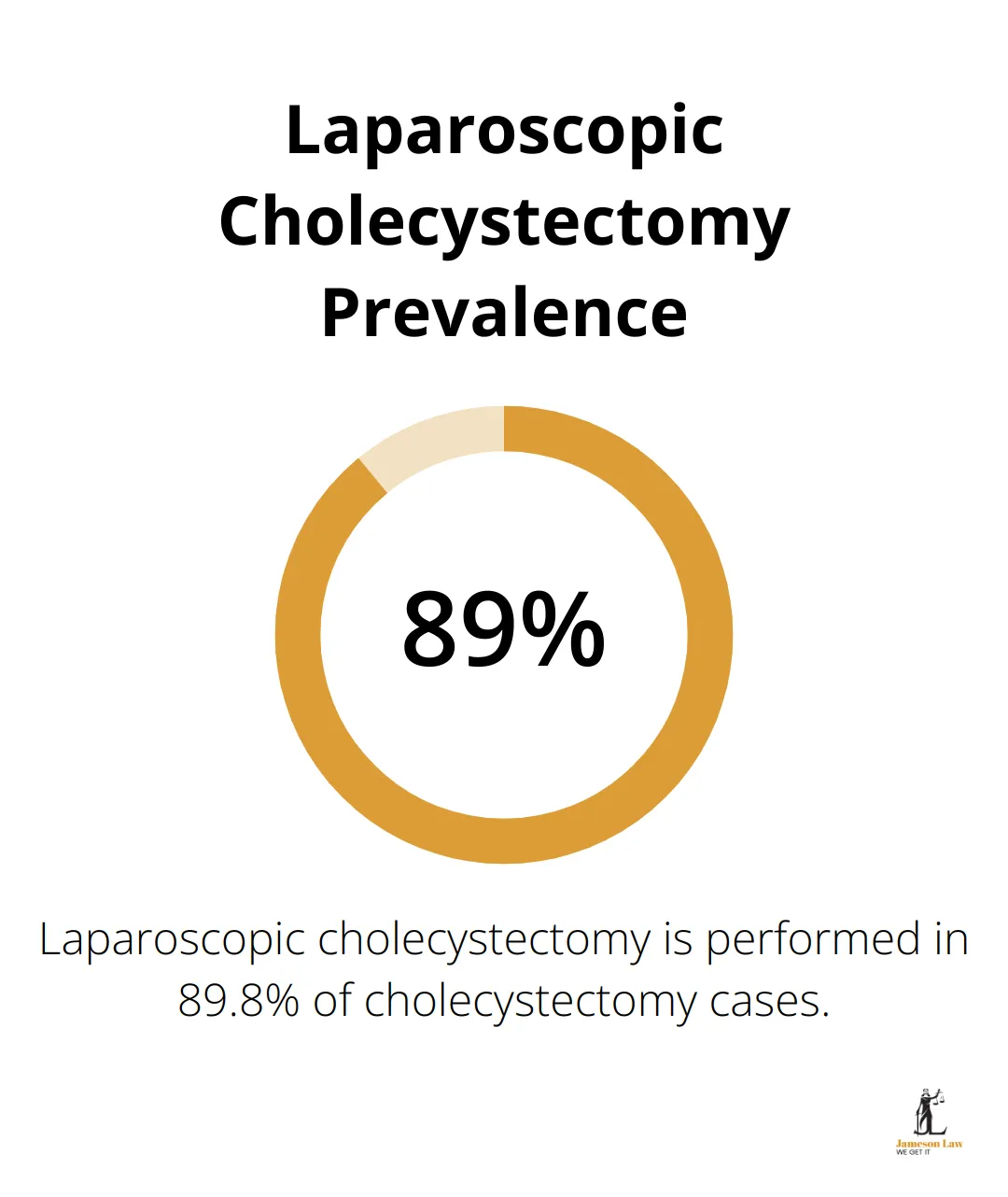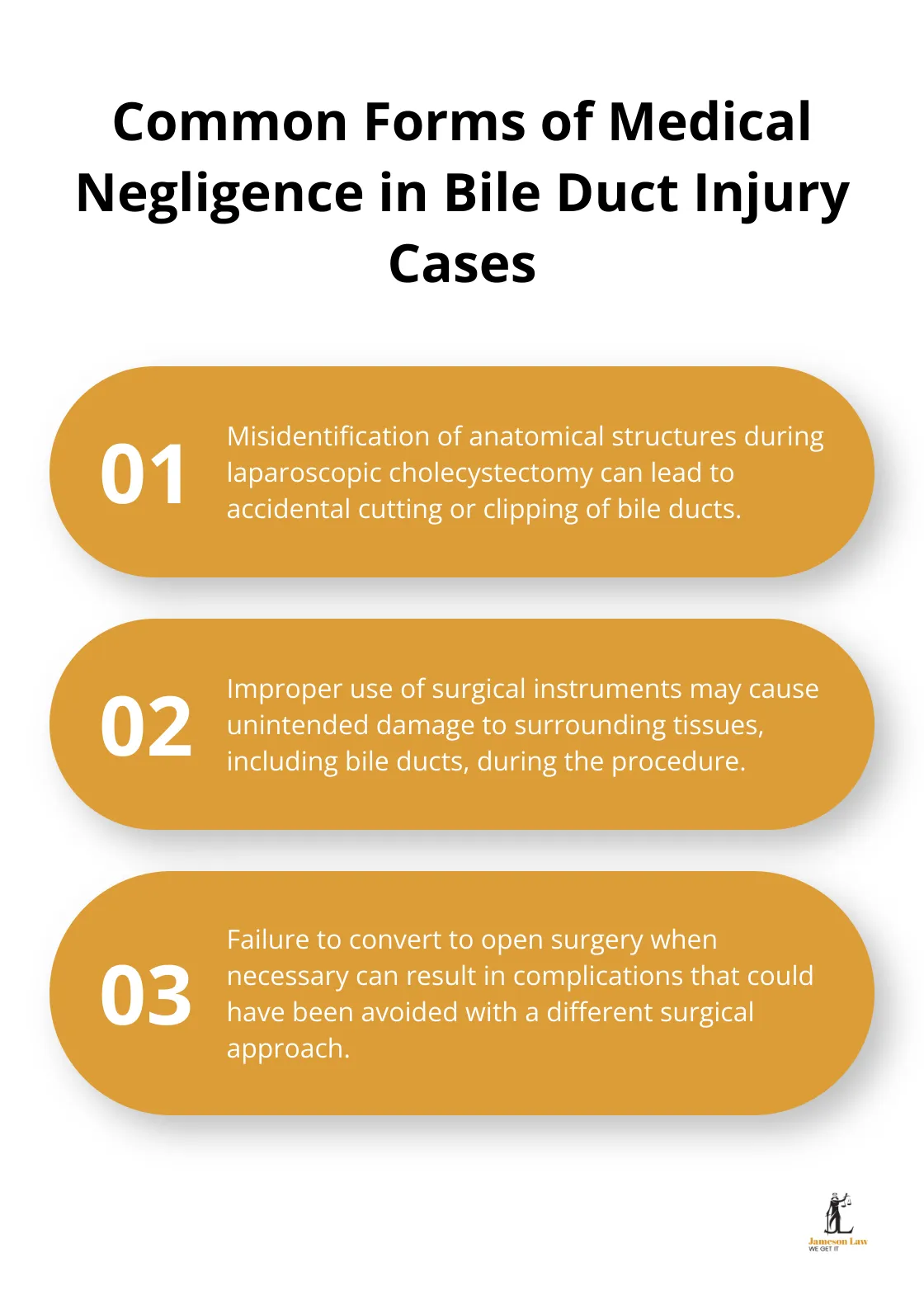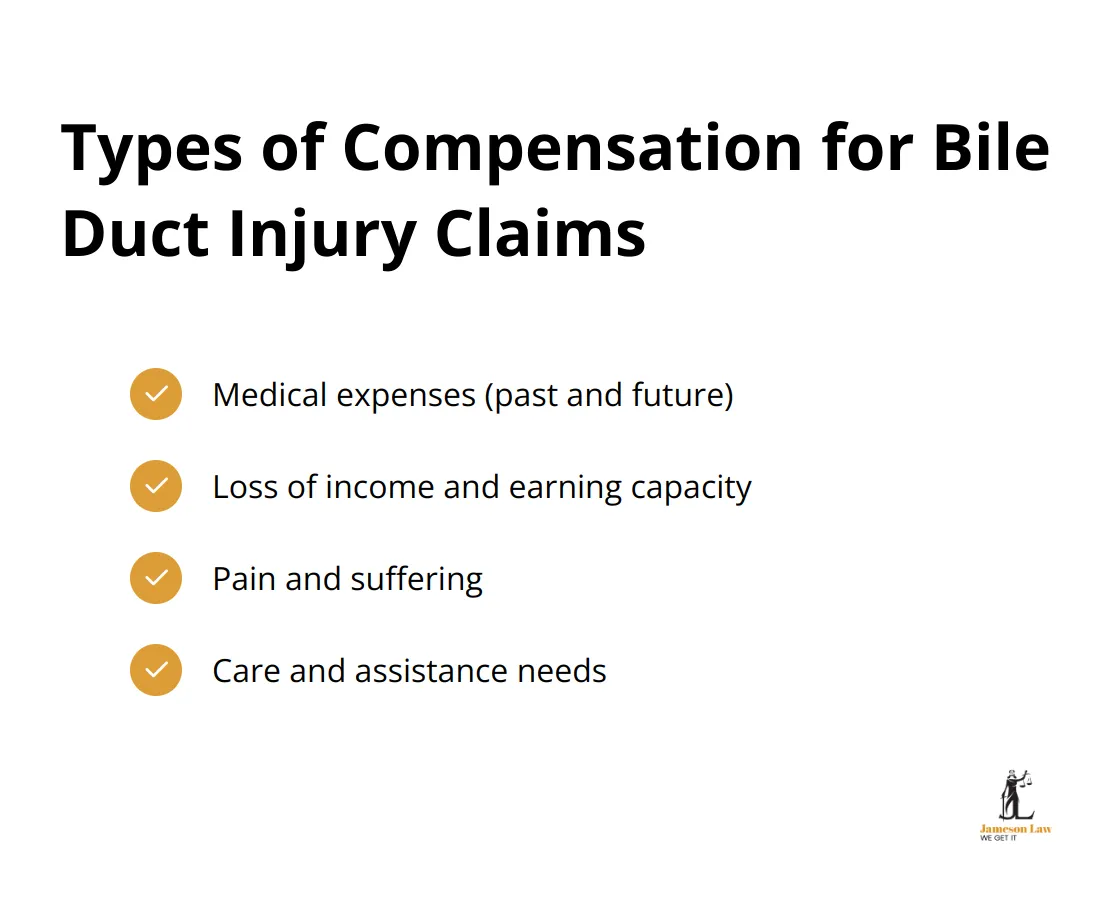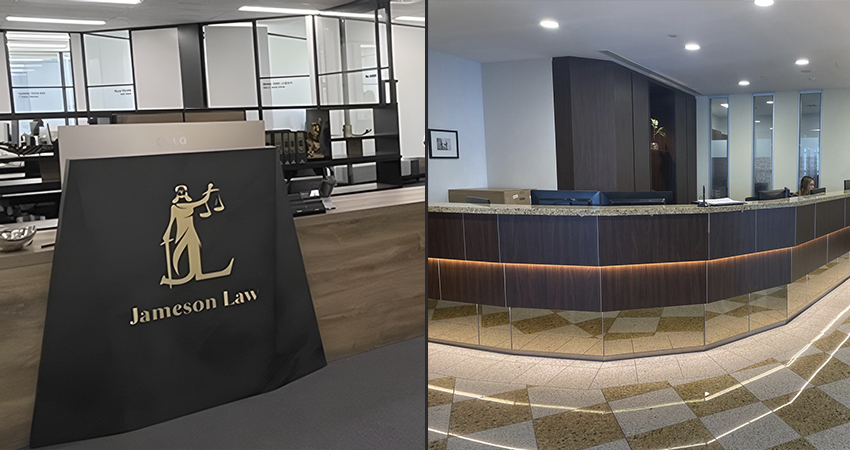Bile duct injuries can have devastating consequences, affecting your health and quality of life. These injuries often result from medical negligence during surgical procedures.
At Jameson Law, we understand the complexities of bile duct injury compensation claims. Our team is dedicated to helping victims navigate the legal process and secure the compensation they deserve.
What Are Bile Duct Injuries?
Understanding Bile Duct Injuries
Bile duct injuries are serious complications that can occur during gallbladder surgery, particularly laparoscopic cholecystectomy. These injuries happen when a surgeon accidentally cuts, clips, or burns the bile ducts (the tubes that carry bile from the liver to the small intestine).
The Severe Impact on Health
Bile duct injuries can lead to severe health problems. When bile leaks into the abdominal cavity, it can cause inflammation, infection, and even sepsis. Patients often experience intense abdominal pain, fever, and jaundice. In some cases, these injuries can threaten a patient’s life if not promptly diagnosed and treated.
A study published in the Medical Journal of Australia reveals that laparoscopic cholecystectomy was performed in 89.8% of cholecystectomy cases. This high percentage underscores the importance of understanding the risks associated with this common procedure.

Long-Term Health Consequences
The effects of bile duct injuries extend far beyond immediate surgical complications. Many patients face ongoing health issues that significantly impact their quality of life. These can include chronic pain, recurrent infections, and the need for multiple corrective surgeries.
Prevention and Early Detection
While bile duct injuries are serious, surgeons can often prevent them. Extreme caution and proper techniques during gallbladder surgeries are essential. Additionally, early detection of gallbladder and bile duct issues through a hepatobiliary scan leads to timely treatment and a good prognosis for most conditions.
Patients should seek immediate medical attention if they experience any unusual symptoms after gallbladder surgery. Prompt action can make a significant difference in the recovery process and potential legal outcomes.
As we move forward, it’s important to understand how these injuries can lead to compensation claims. Let’s explore the eligibility criteria for bile duct injury compensation in the next section.
Can You Claim Compensation for Bile Duct Injuries?
Types of Medical Negligence in Bile Duct Injury Cases
Bile duct injuries from medical negligence can devastate patients’ lives. These injuries often result from surgical errors during laparoscopic cholecystectomy. While the risk of bile duct injury during this procedure is generally low, the impact on affected individuals is profound.
Common forms of negligence include:
- Misidentification of anatomical structures
- Improper use of surgical instruments
- Failure to convert to open surgery when necessary
- Delayed diagnosis of bile duct injury post-surgery
Each error can lead to severe complications, necessitating additional surgeries and long-term medical care.

Time Limits for Filing a Claim in Australia
Australian law sets specific timeframes for filing medical negligence claims, which vary by state. Generally, you have three years from the date of the negligent act or from when you first became aware of the injury to file a claim. However, courts may extend this period in certain circumstances.
Medical negligence and medical malpractice, while closely related, differ in intent and legal handling. Swift action is essential once you suspect negligence, as delays can complicate your case and potentially bar you from claiming compensation.
Proving Causation and Negligence
Establishing causation and negligence in bile duct injury cases requires a thorough approach. You must demonstrate that:
- The healthcare provider owed you a duty of care
- They breached this duty through negligence
- This breach directly caused your injury
Medical records, expert testimonies, and detailed documentation of your symptoms and treatment journey form the backbone of a strong case.
The Role of Expert Evidence
Expert medical opinions significantly influence the outcome of bile duct injury cases. These experts explain complex medical procedures to the court and highlight where standards of care fell short. They also provide insights into the long-term impacts of the injury on your health and quality of life.
This underscores the need to engage qualified medical experts to support your claim.
Compensation and Damages
Successful claims may entitle you to compensation for:
- Medical expenses (past and future)
- Loss of income and earning capacity
- Pain and suffering
- Care and assistance needs
The compensation amount varies based on the injury’s severity and its impact on your life. In some cases, compensation for bile duct injuries can be substantial, particularly when long-term care is necessary.

As we move forward, it’s important to understand the steps involved in claiming bile duct injury compensation. The next section will guide you through this process, ensuring you’re well-equipped to pursue your claim effectively.
How to Claim Bile Duct Injury Compensation
Collect Comprehensive Medical Records
The foundation of your claim rests on your medical records. Gather all relevant documents, including:
- Surgical reports
- Post-operative care notes
- Diagnostic test results (CT scans, MRIs)
- Treatment plans
- Medication lists
- Follow-up appointment records
These records provide essential evidence of the injury and its impact on your health. The Australian Commission on Safety and Quality in Health Care sets requirements for providing comprehensive care for all patients, including actions related to health literacy and end-of-life care.
Seek Expert Medical Opinions
Expert medical opinions hold significant weight in bile duct injury cases. Consult with specialists such as hepatobiliary surgeons or gastroenterologists who can provide professional assessments of your injury. These experts will:
- Evaluate the standard of care you received
- Identify potential negligence
- Assess the long-term implications of your injury
Engage a Specialised Personal Injury Lawyer
The legal complexities of a bile duct injury claim require expertise. A specialised personal injury lawyer will:
- Assess the strength of your case
- Guide you through the legal process
- Handle communications with insurance companies and healthcare providers
- Ensure you meet all legal deadlines
Many law firms offer a No Win No Fee policy for personal injury claims, which allows you to pursue your case without upfront legal costs.
Negotiate and Consider Settlement Options
Many bile duct injury cases resolve through negotiation rather than court proceedings. Your lawyer will engage with the responsible parties to seek a fair settlement. This process involves:
- Presenting evidence of negligence and damages
- Calculating the full extent of your losses (including future medical needs)
- Negotiating with insurance companies or healthcare providers
If negotiations fail to result in a fair settlement, your lawyer might advise proceeding to court. While this can be a longer process, it may prove necessary to secure the compensation you deserve.
Final Thoughts
Bile duct injuries can alter lives, affecting health, finances, and overall well-being. Seeking compensation for these injuries holds medical professionals accountable and ensures necessary long-term care. The process of claiming bile duct injury compensation requires a deep understanding of medical procedures, legal standards, and the Australian healthcare system.
At Jameson Law, we specialise in handling bile duct injury compensation claims. Our experienced lawyers understand the nuances of these cases and fight for your rights. We offer a No Win No Fee policy for personal injury claims, allowing you to pursue justice without financial stress.
If you have suffered a bile duct injury due to medical negligence, take action promptly. Consult with a legal professional who can assess your case and guide you through the claims process. Time limits apply to medical negligence claims in Australia, so swift action is essential.









